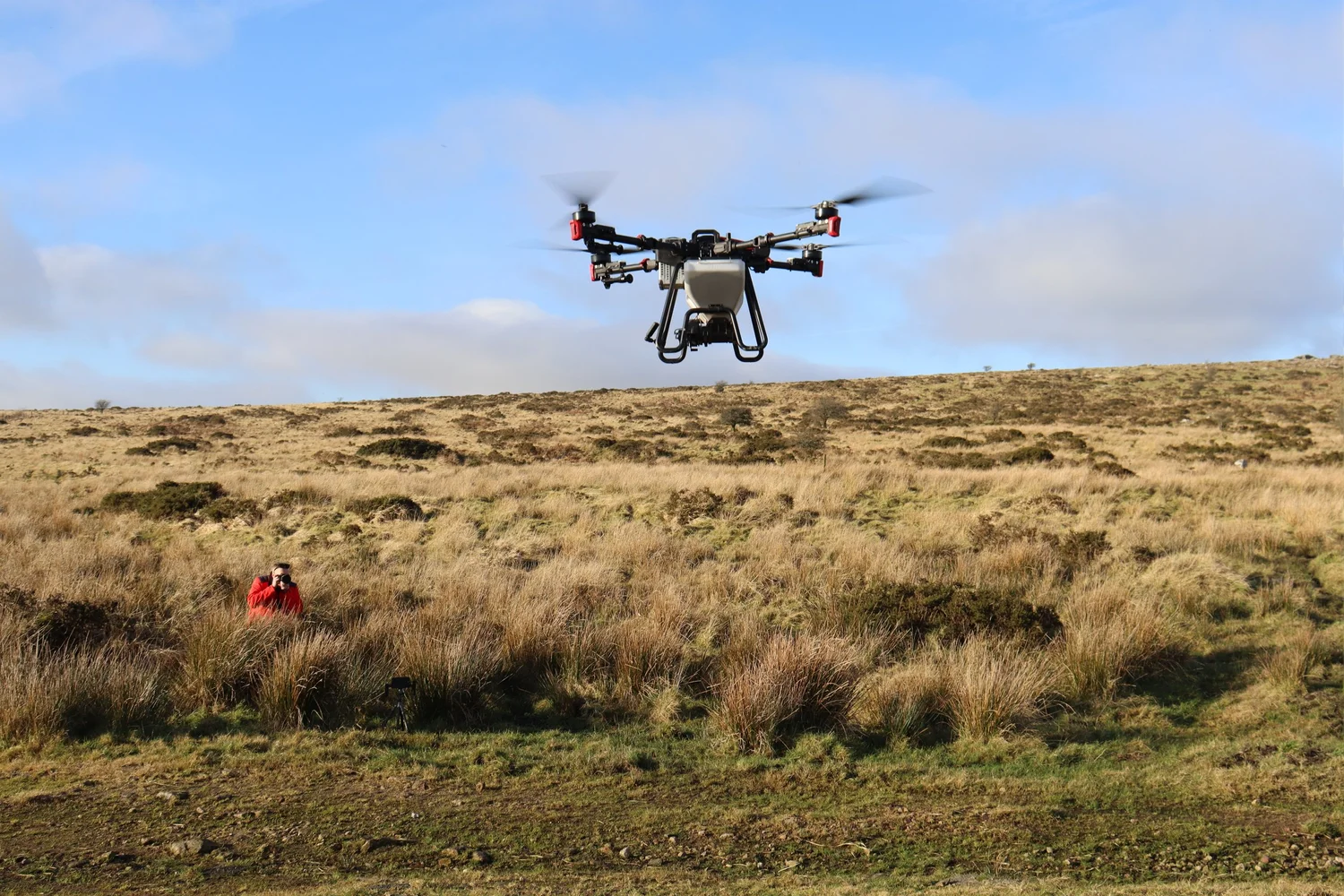Sky Seeding: 75,000 Native Tree Seeds Sown by Drone
Written by: Alejandra Hart
The drone in action over Bodmin Moor. Credit Bella Williams
At the Woodland Trust, we are taking a bold step towards restoring the UK’s forgotten temperate rainforests with an innovative drone-seeding trial in the South West of England. In one of the largest trials of its kind, we have used native tree seeds and high-tech drones to sow 75,000 seeds across the rolling hills of Bodmin, Cornwall.
The Woodland Trust is a founding member of the South West Rainforest Alliance (SWRA), whose mission is to triple the amount of temperate rainforest in Devon and Cornwall by 2050, increasing its coverage from just 8% to 24%. Along with other SWRA partners we are working to find innovative methods to accelerate rainforest recovery while overcoming challenges like difficult terrain and high costs.
The drones, weighing 110kg and capable of carrying up to 58kg of seeds, hover just a few metres above the ground. This allows them to reach areas inaccessible to traditional planting methods. By dispersing a carefully curated mix of native tree seeds, such as pedunculate oak, alder, wild cherry, downy birch, and hazel, we hope the drones will be able to mimic natural regeneration processes in some of the most challenging landscapes.
The seed mix with wood pellets and saw dust to help with the seed dispersion. Credit: Ted Simpson
“Restoring and expanding our temperate rainforests are vital to solving the climate and biodiversity crises. A key part of that is developing innovative methods of woodland creation which has the potential to be faster, cheaper and reach inaccessible sites unsafe for human tree planters”
Sam Manning, Project Officer – Rainforest Recovery
Mixing the seed. Credit Ted Simpson
Over eight hours, the drones seeded 11 hectares of land, including steep slopes and ex-mining sites. To measure success, we have created control areas to compare drone-seeded sites with naturally regenerating areas. Over the next three years, we will monitor germination rates and tree growth, aiming for at least a 25% success rate. If successful, this method could inspire practitioners and funders to invest time and money into refining the effectiveness of drones for woodland creation.
Drone seeding at scale is still in its early stages. For this trial, we collaborated with Autospray Solutions Ltd., the only UK company currently licensed for large-scale drone seeding. We also had to carefully refine our seed mix to ensure even dispersal, mixing smaller seeds with sawdust to prevent clumping.
The team behind the sky seeding project. Credit Bella Williams
Thanks to the support of landowners - including Oxygen Conservation, South West Water, and the 1000 Year Trust - the trial was conducted across three key sites on Bodmin Moor: Cabilla, Siblyback, and Stannon. The sites were chosen for their high rainforest restoration potential. Conditions varied widely, from tightly grazed grasslands to dense gorse and former mining landscapes. By comparing seeding success across these different environments, we aim to fine-tune this method for broader application. This trial marks an exciting step towards revolutionising woodland creation and could be a game-changer for tree planting, especially in hard-to-access sites like coastal areas and steep slopes.
A huge thank you to everyone involved, particularly Sam Manning and Rob Daulby, for their dedication despite weather challenges and meticulous seed calculations! As we continue learning and refining our approach, we remain optimistic that drone seeding will play a crucial role in restoring the UK’s temperate rainforests.
Rainforest Recovery is the South West strand of The Rainforest Restoration Project. It is being led by the Woodland Trust in partnership with Plantlife. This project is funded as part of the Government's Species Survival Fund. The fund was developed by Defra and its Arm's-Length Bodies. It is being delivered on behalf of Defra by The National Lottery Heritage Fund.





